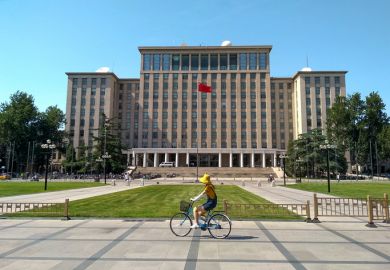“It’s like a diary. It records all these impacts to which we are getting exposed, one, two, three, four, five decades before we actually develop a cancer.” Martin Widschwendter, professor of women’s cancer and head of the department of women’s cancer at University College London, is talking about a research project he is leading. The “diary” in question is the epigenome, which records molecular changes as surrogate markers for an individual’s response to environmental, lifestyle and genetic factors that lead to the development of cancer.
The project led by Widschwendter is called FORECEE (4C) and it will start on 1 September and run for four years. It aims to develop a test that can look at any woman’s epigenome to determine her risk of developing four female cancers – breast, cervical, endometrial and ovarian – and give her the information that she needs to manage her risk and take preventative action. The project will look at the ethical questions involved in telling women about their future risks of developing cancer and about whether a test would be cost-effective for national health systems. But if the predictive test is found to be viable, Widschwendter says that it would be “a complete game changer that would completely transform preventative medicine”.
FORECEE has just been awarded €8 million (£5.7 million) of funding through Horizon 2020, the European Union’s research and innovation programme, to go alongside €1 million from The Eve Appeal, a UK charity which raises money to fund research at UCL’s department of women’s cancer. With the exception of European Research Council grants, EU-funded research projects are generally required to involve multinational partners. FORECEE involves 14 partners from across Europe, including, alongside UCL, the Karolinska Institute, the Stockholm-based medical university; Erasmus MC, a group of Rotterdam-based experts on medical decision-making; and the University of Cambridge.
“These sorts of scale projects [are] only really feasible if top institutions across Europe join up,” says Widschwendter, as there are “so many specialties that you have to involve”. In this project, the Karolinska Institute has a unique resource: a collection of unused cells from 500,000 cervical smear samples taken from women in Sweden undergoing tests from 2011 onwards, some of whom will have, inevitably, gone on to develop one of the four women-specific cancers after they gave their sample. The Karolinska samples will tell the FORECEE researchers “whether the test that we develop based on actual cases and controls really holds true if we analyse the samples years in advance of the diagnosis”, says Widschwendter.
Could the project have got off the ground if only UK research funding had been available? “If you ask me, honestly, I would say no,” answers Widschwendter. “There is clearly no expertise that we have or collections that we have here in the country [to match the Karolinska samples]. So we are forced, for this particular project, to work with Karolinska.”
The example of FORECEE is not a one-off: Universities UK has said that British universities benefit from £1.2 billion a year in European research funding. With an EU referendum on the horizon, UUK has launched a major campaign, Universities for Europe, aiming to highlight “how EU membership enhances British universities’ positive impact on individuals, the economy and society”. The referendum is UUK’s number one campaigning priority at present.
Universities are likely to be a significant voice in the campaign for the UK to remain in the EU ahead of a referendum, to be held by the end of 2017.
“In” advocates in British higher education say that an exit from the EU could threaten the UK’s participation in EU research programmes and thus the future creation of major multinational research projects such as FORECEE. There are also questions about whether a Brexit would throw up major obstacles restricting the flow of researchers and students to the UK, adding up to a twin threat to the position of British universities as world leaders.
But those sceptical of the argument on the importance of EU membership for UK universities suggest that the nation could simply direct its existing EU contribution to research into its own projects, or strike a deal to remain an “associated country” on research programmes. As a Brexit would also allow universities to charge EU students higher fees and bring an end to UK taxpayer “subsidies” for them, some argue that a Brexit could bring financial benefits for universities and the public.
If universities want to be among the standard bearers for the “in” campaign, then the troops of the “out” campaign will be gunning for their arguments.
Research funding
Speaking to Times Higher Education, José Manuel Barroso, president of the European Commission between 2004 and 2014, says that the EU research funding received by the UK is “a result of the excellence of research in many of the British universities…The UK is receiving more than what its economic or demographic dimension would entitle it to receive. So it’s a very important player in European research and education.”
Barroso, who now holds a number of academic posts, including that of Frederick H. Schultz Class of 1951 visiting professor of international economic policy at Princeton University, calls Europe the “most advanced” region in the world, “even more than the US, in terms of student and faculty mobility”. “I believe that if the UK is no longer a member of the EU, there will certainly be a loss of research funding, a loss of EU and [global] research networks”, he says, citing EU-funded projects that create cooperation between researchers in Europe, the Americas and Asia. There would also be “damage to faculty and student mobility”.
The UK’s strong performance in EU research funding was shown in statistics published last month which revealed that British researchers won 20 per cent of the ERC’s flagship advanced grants in the 2014 round, more than any other nationality.
The UK government’s own “balance of competences” review, published in 2014 under the coalition to analyse what EU membership means for the UK’s national interest, had a clear finding on research. “The UK does exceptionally well from the EU’s current seven-year research budget, Framework Programme 7 (FP7) [the predecessor to Horizon 2020], receiving €6.1bn or 15.4 per cent of the funds allocated to date, second only to Germany which has received 16.1 per cent. This equates to a higher percentage of FP7 funding than either our share of EU Gross Domestic Product (GDP) or population; only the Netherlands does better on either of these measures,” says the review, almost mirroring Barroso’s views.
However, the review does go on to say that the UK’s small businesses do much less well out of EU research funding than the nation’s universities. And like other richer member states, the UK is one of the largest net contributors to the EU budget overall.
Jonathan Arnott, an MEP who is the UK Independence Party’s spokesman for the EU budget and also speaks for the party on some education issues, says: “Our view is simply that we are getting back a portion of the money which we already contribute towards the EU budget.” If the UK left the EU then Ukip “would ensure that funding for research would be maintained, which of course you could do with the money [within the broader UK budget] that would be there from leaving the EU”, he adds.
Alison Wolf, Sir Roy Griffiths professor of public sector management at King’s College London, says that there are “all sorts of good reasons for staying in the EU – but preserving university teaching and university research money cannot be one of the most important ones”.
The UK “pays a great deal out for research, we get maybe slightly more back in return but not much, there are lots of administrative overheads”, she argues of EU funding. And she adds: “If we’re no longer paying into the EU research fund, it beggars belief that it won’t get paid into a British research fund.”
The point about the supposed bureaucracy and complexity involved in EU research funding is taken up in the UK’s balance of competences review. The review also says: “Some stakeholders expressed frustration at the seemingly arbitrary requirement for proposals to have participants from a range of different countries and from industry as well as academia in order to attract funding. They believed this sometimes meant that the pursuit of excellence was compromised.”
Those who advocate the benefits of EU membership to British universities argue that this aspect of EU funding, requiring projects to be multinational and multidisciplinary, means that purely UK investment in research could not achieve the same outcomes. UUK and the UK HE International Unit say in their submission to the balance of competences review that international collaborations “encourage excellence by bringing together the most outstanding researchers in the field, provide opportunities to share best practice across partner institutions, provide access to international facilities and large international datasets and tend to result in high publication and citation rates”.
Sometimes cited in the case for EU research funding is graphene, the super-thin “wonder material” beloved of George Osborne and developed by Sir Andre Geim and Sir Konstantin Novoselov at the University of Manchester. That earned them the Nobel Prize for Physics in 2010 and now researchers around the world are studying a huge range of potential applications for the material, including transforming electronics and creating safer, thinner condoms.

Luke Georghiou, vice-president for research and innovation at Manchester, says that Sir Konstantin and Sir Andre benefited from ERC grants totalling about €12 million, including a starting grant for the former “out of which the graphene work had vital early support”. Meanwhile, the Graphene Flagship, billed as the EU’s biggest ever research initiative, has been set up to investigate and exploit opportunities offered by the material with €50 million of total EC funding under Horizon 2020 and €54 million under the previous framework programme. The project brought a 600-delegate conference to Manchester in June. Manchester’s National Graphene Institute was established this year with £38 million from the UK government and £23 million from the EU’s European Regional Development Fund.
In his Nobel prize lecture, Sir Andre acknowledged the financial support of the UK’s Engineering and Physical Sciences Research Council, via its responsive mode, and other funders. But he launched an attack on bureaucracy in EU funding, adding that “I can offer no nice words for the EU framework programmes which, except for the European Research Council, can be praised only by Europhobes for discrediting the whole idea of an effectively working Europe”.
Georghiou agrees that the EPSRC “was an important funder of the work. But I don’t think the same momentum could have been achieved purely with national funding. The EU seems to find it more easy to focus on priorities and build them up quicker.” He adds that the international networks developed via that funding make it “more feasible for us to match the efforts in Asia and North America” on graphene applications.
But could the UK not exit the EU and still retain the benefits of the union’s research programmes? Non-EU nations such as Norway, Turkey and Israel do just that as “associated countries” to Horizon 2020.
Mike Galsworthy, co-founder of Scientists for EU, believes that as Horizon 2020 is well under way, the UK would remain involved even if the referendum backed leaving the EU – although, after 2020, when that programme ends, the UK would have to negotiate involvement in a new framework programme if it was outside the EU. “As an associated country, the UK would have a much diminished say in the shape of that programme,” argues Galsworthy.
Other “in” advocates make the argument that the UK would be trying to negotiate continued access to Horizon 2020, or to a future framework programme, after a Brexit when the rest of the EU would be bristling with anger at the British government. And no EU nation has ever gone from full member status to being an “associated country”, they point out.
Galsworthy says: “I would hope that a ‘no’ vote would have little impact on the UK’s participation in the Horizon 2020 programme. This is unless, of course, the UK decides to put down immediate and aggressive anti-immigration rules. In which case there would likely be harsh renegotiation around Erasmus+ [the EU’s student and staff mobility programme, see Bologna and Erasmus: the impact on the UK box below] and Horizon 2020 terms of engagement.”
There is a precedent for this: Switzerland, which had been an associated country under Framework Programme 7, held a referendum on immigration in 2014. Voters narrowly backed tougher rules, obliging the Swiss government to restrict immigration into the country from the EU. That angered the EU, as it sees freedom of movement as a keystone of the single market. And what were the sticks that the EU used to beat Switzerland in response? The Horizon 2020 and Erasmus+ programmes. The EU suspended talks with Switzerland over its participation as an associated country in both, stating that the programmes rely on freedom of movement.
Some see that as a calculated warning to the UK. Kurt Deketelaere, secretary-general of the League of European Research Universities, says: “Switzerland has been punished, not only because of violation of a basic EU rule [freedom of movement], but also because the EC wanted to indicate to the UK: ‘see what will happen if you decide to limit free circulation of people between the UK and the EU; out of the EU and not even associated membership’.”
Barroso, who was still EC president at the time, says that Switzerland “lost access to funding and to participation in our programmes. It was a drama. I can tell you the Swiss universities, they [did] everything they could to avoid that…I did my best to find a transitional solution, so they could prolong their access to our programmes, mobility and funding programmes.”
As Barroso indicates, a deal between the EU and Switzerland granting access to “parts of Horizon 2020” (such as Pillar 1 of the programme including ERC grants and the Marie Skłodowska-Curie Actions supporting researcher mobility) until the end of 2016 was signed in December 2014. “In all other parts of the Horizon 2020 programme, Switzerland will remain a non-associated third country participant,” the agreement says.
Barroso draws a lesson from the Swiss case. “One point I want to draw from this experience is the following: they [the Swiss] did not, before the referendum…make their case about how important it was for them to keep their presence in the EU research space,” he says. “Now they are doing it…Sometimes we only give value to things when we lose them.”
In terms of the prospect of the UK being entirely outside Horizon 2020 or future EU programmes, the UK government’s balance of competences review struggled to find evidence for what such a scenario would look like. “The literature review undertaken for this report found no scholarly papers addressing the question of whether EU funds allocated to research could get a better return if invested differently, for example through national research budgets,” it says.
Mobility
Would the UK’s universities be damaged by barriers to student and researcher mobility if the nation left the EU? Or could there be benefits?
No more EU membership would mean no more entitlement to UK government fee loans of up to £9,000 a year for EU students (unless the UK signed up to the European Economic Area, membership of which currently gives nations’ students equal access to UK fee loans). UK universities would be entitled to charge EU students whatever fee they saw fit, as they do with non-EU students. Average undergraduate tuition fees for non-EU students in 2014-15 were £11,987 in classroom-based subjects and £13,774 in laboratory-based courses, according to the most recent THE international and postgraduate fee survey, compiled by The Complete University Guide.
The number of EU students coming to the UK is significant. There were 78,845 EU-domiciled undergraduates at UK universities in 2013-14, making up 4.5 per cent of total numbers, according to figures from the Higher Education Statistics Agency. And there were 46,455 EU-domiciled postgraduates, equating to 8.6 per cent of total numbers.
To some, the Brexit scenario looks attractive in this context. Ukip’s Arnott highlights the difficulty of recouping loan repayments from EU students when they return home, and claims that lower salaries, particularly in Eastern Europe, will put some below repayment thresholds for longer than UK students. “I welcome students from other European countries coming to the UK,” he says. “But I don’t welcome the notion that the UK taxpayer should be the one to subsidise that.”
Wolf shares that view. “I don’t think the job of the British taxpayer is to finance the maximum number possible of EU students,” she says.
Statistics published by the Student Loans Company in 2014 show that 19 per cent of EU borrowers with loans and now resident overseas were below the earnings threshold for their country of residence, while another 11 per cent were listed as having been placed in arrears after failing to provide details of their income.
David Goodhart, chair of the thinktank Demos, says in his submission to the balance of competences review of freedom of movement that equal treatment of EU and UK students on fees “seems to have had the perverse effect of keeping the number of European students in the UK lower than it might otherwise have been as universities have a much bigger incentive to attract foreign students from outside the EU who pay higher fees. A fee structure somewhere between the UK level and the outside EU level [for continental students] should be considered.”
UUK and the UK HE International Unit say in their submission to the balance of competences review on education: “For UK higher education institutions, the EU primarily adds value in the field of education and training, through the provision of funding for staff and student mobility, building on the principle of freedom of movement enshrined in the treaties and central to the single market.”
Chief among these funding provisions is the Erasmus+ programme for students and staff, which supported 14,572 UK students to study abroad in 2012-13, according to EC figures.
The UK government says in the competences review on education that it is “reasonable to say that relatively low numbers of UK students studying abroad would have been lower still, were it not for the support of EU programmes such as Erasmus”. It adds: “On the whole, the government sees EU work to promote international mobility and partnerships through Erasmus+ as a sensible area for EU funding and a legitimate area of added value at European as opposed to national level – a position strongly supported by the evidence received.”
Erasmus+, as the Swiss case highlighted, is one of those programmes for which non-member states must negotiate status as “associated countries” if they wish to take part.
On staff mobility, the Russell Group says in its submission to the competences review of freedom of movement that 18.7 per cent of academic staff at its member institutions in 2011-12 were EU nationals. “The ability of universities to recruit EU nationality (excluding UK) staff and to attract EU nationality students without having to negotiate the UK visa system, with the attendant expense and administrative burden for both parties, is incredibly valuable,” it says.
The figures for EU staff are slightly lower across UK higher education than they are at the Russell Group, with 29,225 or 15 per cent of academics being EU nationals in 2013-14, according to Hesa figures.
Widschwendter, an Austrian who came to work at UCL 10 years ago as a consultant surgeon in gynaecological oncology at University College Hospital, says: “If the UK would stand outside [the EU] and I would need, let’s say accreditation [to enter the country], it probably would have put me off; because I had a very, very comfortable life in Austria. I was professor when I was 30 and I could have put my legs up on the table and said, ‘Well, I’m just enjoying life’.”

Soft power
The Universities for Europe campaign at UUK has already been challenged. Daniel Hannan, the Eurosceptic Conservative MEP, responded to UUK on Twitter when it promoted the campaign. “Only fair to declare the amount of funding you get from the EU,” he tweeted, in reference to universities’ funding (UUK itself receives no EU funding).
British universities “will flourish inside or outside the EU”, Hannan tells THE. “I’d like to see them attracting the best talent globally, able to charge fees that reflect their global pre-eminence, instead of pursuing Kafka-esque Brussels grant applications, but that’s their call, obviously.”
Wolf says of UUK’s campaign that “Universities UK is there to protect the self-interest of the university sector.” The idea that the impact of EU membership on universities should be something that swings the referendum campaign one way or the other “shows how narrowly sectional our view has become as universities”, she argues.
But Barroso sees universities, and British universities, as central to Europe and talks about the “amazing” European “space for research and teaching” created in recent years. “It’s a silent revolution that has been going on in Europe, the result of the Bologna Process, the result of Erasmus, the result of mechanisms of funding from the EU,” he says.
He notes the record of the UK in attracting foreign students – including his son, who studied at the London School of Economics – and continues: “It’s one of the greatest things of Britain, this openness to the world…It [is] beneficial to have so many people, some of the brightest people around the world, in the British system. What that brings in terms of the so-called soft power of Britain is immense…You have to really be a very narrow nationalistic or chauvinistic person not to consider how important this is to Britain. It’s one of the countries that has the highest soft power in the world – thanks to the universities, to a large extent.”
He adds: “Apart from that, in purely financial terms, I remember speaking about this with Tony Blair, Gordon Brown and with David Cameron as well. All of them were very well aware that education is also an export of Britain.”
Barroso’s views will be backed by the referendum votes of many university staff and students, seen as likely to be predominantly pro-EU. But can UUK ensure that the voice of universities is heard more widely in the campaign? The organisation is planning a series of public debates between pro and anti-Europeans. But a national referendum debate focused on immigration or national identity could leave universities struggling to be heard, however loudly they might shout about the positive impact that internationally collaborative EU-funded research has on the lives of individuals in the UK and worldwide.
As the Swiss case shows, the issues of research funding, researcher and student mobility that drive many universities and university staff to support EU membership boil down to the same thing that troubles many Eurosceptics: freedom of movement. Some in the Conservative Party want David Cameron to try to renegotiate freedom of movement ahead of the referendum. But as the EC made clear to Switzerland, freedom of movement is not up for negotiation – and the way it applied painful pressure on that point was through participation in Erasmus+ and Horizon 2020. Perhaps universities, one way or another, will be at the heart of the EU debate after all.
Bologna and Erasmus: the impact on the UK
Erasmus+, the EU’s student and staff mobility programme, plans to provide opportunities for more than 4 million Europeans to study, train, gain work experience and volunteer abroad in its latest programme, running from 2014 to 2020. Erasmus+ will have a budget of €14.7 billion over this period, a 40 per cent increase on the previous funding period.
Meanwhile the Bologna Process, launched in 1999, is a project designed to complete a transition to “comparable, compatible and coherent systems of higher education in Europe”, with the aim that degrees taken in different European nations can be understood and used across the Continent. It is not an EU project, although the EC is a member alongside participant nations.
The Bologna Process led to the creation in 2010 of the European Higher Education Area, now encompassing 48 countries. The Bologna Process is generally seen to have had less impact on the UK than it has had on other major European higher education nations, such as Germany, where it has meant changes to the length and structure of degrees.
A further significant impact of EU policy in higher education is noted by the UK government’s balance of competences review. “One consequence of the right of free movement of persons is that EU students studying in the UK have equal access to vocational and higher education,” it says, which means equal treatment on fees and access to UK government-provided loans for tuition fees.
In the spotlight: horizon 2020: the three pillars
The EU’s research and innovation programmes are known as framework programmes. Horizon 2020 is the latest framework programme, the EU’s eighth, running from 2014 to 2020 and worth almost €80 billion.
Horizon 2020 is made up of three “pillars”: “excellent science”, “industrial leadership”, including information and communications technologies and advanced manufacturing, and “societal challenges”, divided into seven subcategories such as health and energy.
Within Horizon 2020’s first pillar is the funding provided by the European Research Council. The ERC was established in 2007 and Lord Sainsbury, then the UK’s science minister, played a crucial role in its creation. With purely excellence-based criteria for funding decisions, the ERC does not take any thematic or geographical criteria into account, unlike other Horizon 2020 funding schemes. The ERC has an increased budget of more than €13 billion under the new framework programme.
Also within the first pillar are the Marie Skłodowska-Curie Actions, supporting researcher mobility. UK researchers received €1.1 billion via this funding source between 2007 and 2014.
More broadly, in 2000 the EC adopted as a formal objective the creation of a European Research Area. This would involve member states removing all barriers to the “open, transparent and merit-based recruitment of researchers” and removing barriers to portability of national grants.
POSTSCRIPT:
Print headline: Going solo
Register to continue
Why register?
- Registration is free and only takes a moment
- Once registered, you can read 3 articles a month
- Sign up for our newsletter
Subscribe
Or subscribe for unlimited access to:
- Unlimited access to news, views, insights & reviews
- Digital editions
- Digital access to THE’s university and college rankings analysis
Already registered or a current subscriber?









